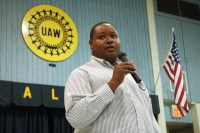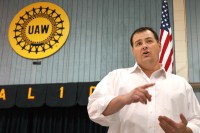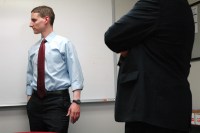Democratic Sen. Sherrod Brown at the Martin Janis senior center in Columbus, Ohio, on Friday, June 15, 2012.
Columbus, Ohio
I have seen approximately 263,547 candidates perform in public during my eons as a political reporter. You can tell the good ones immediately. They’re not all the same–but each of the stars has a quality that just jumps out and grabs an audience. I saw four Ohio candidates over the past 24 hours–one running for State Rep, one for Congress and the two candidates for U.S. Senate. Two were very good, one was a maybe, the fourth didn’t connect at all.
I started at a UAW local 1037 pancake breakfast in the town of Heath, Ohio. The local represents the workers at Meritor, which makes truck axles. Nearly 3,000 people worked in the plant at its peak, in the 1960s. About 260 work there now–but 16 laid-off workers were called back recently, which is the sort of mildly encouraging jobs report I’ve been picking up all over Ohio. The first candidate to speak to the union’s executive board was Jim Reese, a lawyer running for Congress as a Democrat in a Republican district. He had some very good ideas, but he just wasn’t connecting–he was trying too hard. “How many of you are gearheads?” The union leaders seemed puzzled. “How many of you watch Top Gear?” No acknowledgment. Reese had something of a cultural mountain to climb–he was born in Detroit, not locally. He was an African-American in a largely white district. He was a lawyer speaking to people who worked with their hands.

Katy Steinmetz for TIME
The workers were angry about jobs going overseas, about the way Republicans were trying to bust the public employees unions. Reese had some specific ideas about how to bring jobs back: eliminating the tax deduction for transportation costs for American companies who move their products from foreign countries to the American market–but keeping it for products that are made here. The workers seemed to appreciate his ideas, but they couldn’t connect on the most visceral level with him until he started talking about his mom, who sacrificed to put him through private school. “I remember doing homework by candlelight because she couldn’t pay the utility bills,” he said. It was a nice moment, but the air in the room seemed flat and still.
Reese’s problem became obvious when Brady Jones, the local Democratic candidate for state rep stood up and started to talk. He was a big, handsome guy, a union welder wearing a white knit shirt, jeans and steel-toed boots. He was all energy and fury. “I’m tired of politicians who get in office and forget who they are. I’ve been a member of the pipefitter’s union for 17 years and if I get elected, that’s who I’ll be. We’ve got to get our voice back.”–notice the “we” rather than “you”–“I’m sick and tired of those clowns telling us we make too much money, that our pensions are too big. We’re falling behind. We’re not even considered middle-class anymore.”

Katy Steinmetz for TIME
Jones said he was working hard, knocking on doors in neighborhoods that were considered Republican. “I tell those people that it’s not about Democrat or Republican. It’s about getting our middle class voice back. We have to stand up and say we’ve had enough.” Reese had been more specific; in fact, Jones wasn’t specific at all–but he was an entirely compelling, charismatic presence. The union guys were with him all the way. I don’t know if he has a chance of beating his Republican opponent, but I suspect he’ll make it one hell of a fight.
From Heath, we drove to Columbus and visited with Josh Mandel, the state treasurer and a veteran of two tough tours in Iraq with the Marines. As soon as I saw him, I asked how old he was. “Yeah, I know,” he said. “I’m 34 but I look 19.” Mandel was scheduled to speak at a training session for Republican candidates for the state legislature. His presentation ranked somewhere between Jim Reese and Brady Jones. He seemed smart and decent, but somewhere way on the down side of charismatic. He had the same formula for success as Brady Jones did, though: “When I first ran for state legislature in a predominantly Democratic district, everyone told me it was impossible. The business community wouldn’t back me because they thought it was a waste of money. But here’s what we did: I knocked on 19,679 doors and talked to people. The best way to win support is to look them eyeball to eyeball on their doorstep and get invited inside, if you can.”

Katy Steinmetz for TIME
He said that he thought there was one big issue that might win over blue-collar democrats–the looming oil and gas boom in the eastern part of the state, which was going to provide lots of jobs and revenue. He said his opponent, the incumbent Sherrod Brown, had opposed drilling on public lands. He also said Brown was getting all sorts of money for TV ads from special interests. “He got $500,000 from SEIU [the service employees international union].”
Mandel was smart and attractive, but very low key. He might well develop into a fine politician over time, and I certainly think that combat vets like Mandel bring a terrific can-do toolset to public service, but the idea of him running for Senate seemed a reach at this point of his life–a fact that became very apparent when I caught up with Sherrod Brown this morning in Columbus.
Brown is, whether you like his old-fashioned liberalism or not, a terrific stand-up politician. I saw him work a room of retirees at a senior center and he seemed entirely at ease, truly interested in what they had to say. When we sat down to talk, he swatted away Mandel’s arguments against him with elegant nonchalance. Yes, he had opposed oil and gas drilling in Athens, Ohio, because the entire city council and local Chamber of Commerce had urged him to do so: there was a reservoir nearby that might be endangered. He then rattled through programs he had and supported to get the drilling started, and to make sure that the “jobs go to Ohioans, not to folks coming up from Texas and the Gulf.”
As for the claim that Democratic special interests were throwing a lot of money into the race: “We’ve received $1.5 million. Mandel has received $8.3 million from Republican Super PACs,” he said. “If he didn’t have that $8 million, this wouldn’t be much of a race.” In fact, Brown was confident that both he and Obama would win Ohio in November. “Romney doesn’t connect with people here and the unemployment rate is 3 percentage points lower than it was 3 years ago.”
The auto bailout made all the difference and Brown proceeded to sing the praises of the Chevy Cruze, which is made at Lordstown–where the factory, which was nearly idle three years ago is now working triple shifts. “It’s an Ohio car!” Brown said, in his gravelly, unpretentious voice. “Assembled in Lordstown. The engine is made in Defiance. Transmission in Toledo. Steel in Toledo. Aluminum in Cleveland.” He went all the way to the seat covers and sound system–all made in Ohio. “Then you’ve got the Jeep Wrangler and Liberty being assembled in Toledo–with 75% domestic sourced parts.” (I wouldn’t be surprised to see an “Ohio Car” ad emanating from either Brown or Obama campaigns in the weeks to come.)
When he and the President made this argument, he believed, the white working-class men who were drifting toward the Republicans would come home. “That’s where Obama wins the race and that’s where I win the race.”
He didn’t sound worried at all.


